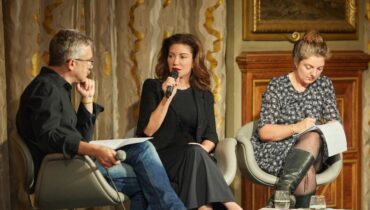“We must never make schools battlefields of war or instruments of terror” – Ngozi Okonjo-Iweala, Minister of Finance, Nigeria
Since Boko Haram’s kidnapping of more than 250 schoolgirls from their dormitories in Chibok in April, the world’s attention has turned to Nigeria, where 10.5 million children are currently out of school. Nigeria is now the largest economy in Africa, having surpassed South Africa, and has enormous potential for future growth and leadership in Africa. However, without educating its young people, this potential will stagnate. In Northern Nigeria, where Boko Haram is still active, a child is 30 times more likely to be out of school than in Southern Nigeria. While Boko Haram is a critical threat that needs to be addressed, there are also other challenges that affect whether or not a school is safe.
On Friday, September 26, the Georgetown Institute for Women, Peace and Security hosted an event entitled “Advancing Safe Access to Education for Girls’ Education in Nigeria and Beyond.” The event featured remarks from Nigerian Finance Minister Ngozi Okonjo-Iweala and USAID Administrator Rajiv Shah, and discussed the global issue of safe and secure education for children worldwide.
At Friday’s event, Minister Okonjo-Iweala discussed some of the infrastructure changes that would help improve school safety, such as solar panels to provide 24/7 electricity for schools and dormitories, better sanitation facilities so that girls do not need to walk from their school and dorm rooms to use the bathroom, and alarm systems that would serve as an internal notification system if there were an attack at the school. Currently, the Nigerian government is addressing the problem by allowing girls from the Northern regions that are threatened to transfer to different schools with a full scholarship. She emphasized that the Nigerian government is working to secure the safe return of the Chibok schoolgirls and safe access to education for all students.
At the April meeting of the World Economic Forum in Abuja, only days after the Boko Haram kidnappings, the Nigerian business community committed $10 million to improving safe schools. The government of Nigeria followed with a matching $10 million commitment. Additionally, the U.K. government has committed $1 million, and the Norwegian government has committed $1.5 million. However, financing is only one piece of the puzzle. It is essential that the public and private sectors work together and combine their resources and knowledge in order to ensure safe access to education.
Given the importance of public-private partnership in addressing safe access to education, GIWPS will be partnering with leading strategy and management consulting firm Accenture to take an important first step in addressing Nigeria’s needs. Accenture has committed to conducting a landscape analysis of investments by the private sector in Nigeria focused on shared values. The study will document and assess existing initiatives in order to identify potential synergies (as well as certain gaps) that can be leveraged to address this critical issue and related issues affecting women and girls in Nigeria.
Girls’ education is absolutely essential for economic growth and stability. As Minister Okonjo-Iweala said: “No matter how well an economy does, we will fail to reduce inequality if we do not secure education for girls.”
You can watch the full video of the symposium here and watch the Twitter conversation from the event at #SecureGirlsEd.

